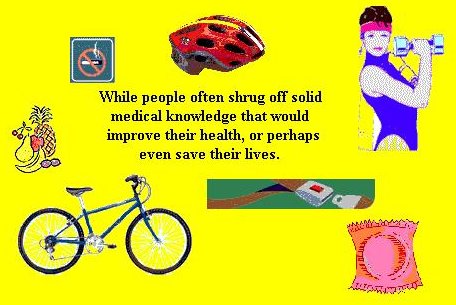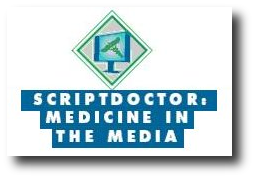1998 Kaiser Media Fellowship in Health"Health Knowledge is Health Power."Never has so much information, particularly
health
information, been available via the media. It spews from televisions
and
radios, and now computers, around the clock and around the year.
Newspapers
publish special sections on health; and entire magazines devote
themselves
to the subject.
But what does it all mean?

My Project:Jump to papers, publications and other products of my research.
To fight smoking, hundreds of millions of dollars from cigarette taxes and legal settlements are being pumped into anti-tobacco ad campaigns. The question is:
With the support of a Kaiser Media Fellowship in Health I am investigating these questions. My aim is to produce a critical analysis of media campaigns and other information-based efforts to prevent teens from smoking. I will also be considering the limitations of even well designed information campaigns. Especially when dealing with an addictive substance such as nicotine, knowledge and persuasion may not suffice to change behavior. Such a limitation was recognized years ago by researchers attempting to reduce the toll of motor vehicle crashes. They realized that the focus on education, teaching people to be "good drivers," would never prevent every crash; people will always make mistakes behind the wheel. So rather than laboring just to change driving behavior, experts shifted their attention to changing the "driving environment." Cars were redesigned to include crumple zones, seat and shoulder belts, and other safety features. Roads were straightened, dangerous intersections rerouted, shock-absorbing barriers installed at freeways exits, bridge pylons, and other obstructions. This paradigm shift led to a substantial and sustained decline in motor vehicle death and injury rates. It may be that a portion of the money and other resources earmarked for anti-tobacco education campaigns would be better directed toward alternate strategies. I will be considering the relationship and relative priority of informational campaigns vis-a-vis other tobacco prevention and control tactics. Why tobacco?Simply put, there is no other matter in which a change in behavior would have as dramatic an effect on public health. As a leading cancer researcher put it, when he opened a briefing session at the meeting of the American Society of Clinical Oncology: "There's a lot of exciting research being presented here, but I would trade it all for an end to smoking." |
|
||||||||||||||||
| Home * House MD * E-mail * Bio * Resume |
Dr. House in Deutschland



